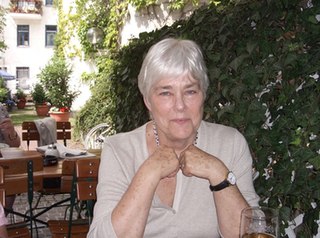Related Research Articles
The following outline is provided as an overview and topical guide to linguistics:
1973 in philosophy
In semantics, a donkey sentence is a sentence containing a pronoun which is semantically bound but syntactically free. They are a classic puzzle in formal semantics and philosophy of language because they are fully grammatical and yet defy straightforward attempts to generate their formal language equivalents. In order to explain how speakers are able to understand them, semanticists have proposed a variety of formalisms including systems of dynamic semantics such as Discourse representation theory. Their name comes from the example sentence "Every farmer who owns a donkey beats it", in which the donkey pronoun acts as a donkey pronoun because it is semantically but not syntactically bound by the indefinite noun phrase "a donkey". The phenomenon is known as donkey anaphora.

Johan Anthony Willem "Hans" Kamp is a Dutch philosopher and linguist, responsible for introducing discourse representation theory (DRT) in 1981.
Language Log is a collaborative language blog maintained by Mark Liberman, a phonetician at the University of Pennsylvania.
Antônio Roberto Monteiro Simões is a Brazilian-born linguist interested in the phonetics and phonology of the Romance languages. Simões is an associate professor of Spanish and Portuguese linguistics at the University of Kansas, in Lawrence, USA, where he teaches Hispanic linguistics. He has authored books, textbooks and articles contrasting the Portuguese and Spanish languages. Simões is currently conducting research work on speech models and foreign language learning models, especially in relation to phonetics and phonology. Simões work on modeling is a continuation of his Ph.D. thesis; an adaptation of the late Dennis Klatt's 1976 pioneering model to predict duration in connected speech.
Lauri Juhani Karttunen was an adjunct professor in linguistics at Stanford and an ACL Fellow. He died in 2022.

Deirdre Susan Moir Wilson, FBA is a British linguist and cognitive scientist. She is emeritus professor of Linguistics at University College London and research professor at the Centre for the Study of Mind in Nature at the University of Oslo. Her most influential work has been in linguistic pragmatics—specifically in the development of Relevance Theory with French anthropologist Dan Sperber. This work has been especially influential in the Philosophy of Language. Important influences on Wilson are Noam Chomsky, Jerry Fodor, and Paul Grice. Linguists and philosophers of language who have been students of Wilson include Stephen Neale, Robyn Carston and Tim Wharton.
Barbara Kenyon Abbott is an American linguist. She earned her PhD in linguistics in 1976 at the University of California at Berkeley under the supervision of George Lakoff. From 1976 to 2006, she was a professor in the department of linguistics and Germanic, Slavic, Asian, and African languages at Michigan State University, with a joint appointment in philosophy. She is now a Professor Emerita.
Georgia M. Green is an American linguist and academic. She is an emeritus professor at the University of Illinois at Urbana-Champaign. Her research has focused on pragmatics, speaker intention, word order and meaning. She has been an advisory editor for several linguistics journals or publishers and she serves on the usage committee for the American Heritage Dictionary.
Judith Tonhauser is a Professor of English Linguistics at the University of Stuttgart.
Megan Jane Crowhurst is an Australian- and Canadian-raised linguist and Professor of Linguistics at the University of Texas at Austin in the United States.
Craige Roberts is an American linguist, known for her work on pragmatics and formal semantics.
Jeanette (Kohn) Gundel was an American linguist noted for her work on information structure and pragmatics.

Carol F. Justus was an American linguist who specialized in Indo-European linguistics.
In semantics, pragmatics, and philosophy of language, a question under discussion (QUD) is a question which the interlocutors in a discourse are attempting to answer. In many formal and computational theories of discourse, the QUD (or an ordered set of QUD's) is among the elements of a tuple called the conversational scoreboard which represents the current state of the conversation. Craige Roberts introduced the concept of a QUD in 1996 in order to formalize conversational relevance and explain its consequences for information structure and focus marking. It has subsequently become a staple of work in semantics and pragmatics, playing a role in analyses of disparate phenomena including donkey anaphora and presupposition projection.
Mandy Simons is a linguist and professor in the Department of Philosophy at Carnegie Mellon University (CMU). She researches semantics and pragmatics, in particular phenomena like presupposition and projection.
Elin McCready is an American linguist and professor in the Department of English Language and Literature at Aoyama Gakuin University. She researches semantics, pragmatics, and philosophy of language, focusing in particular on such phenomena as evidentials, honorifics, and slurs. She is also co-director of Aoyama Gakuin University's Singularity Research Institute.
Ashwini Deo is a linguist who specializes in semantics, pragmatics, and language variation and change, with an empirical focus on the Indo-Aryan languages. She is currently Professor of Linguistics at the University of Texas at Austin.
References
- ↑ "UT College of Liberal Arts". Utexas.edu. Archived from the original on 1 July 2014. Retrieved 20 June 2014.
- ↑ "UT College of Liberal Arts". Utexas.edu. Archived from the original on 5 June 2014. Retrieved 20 June 2014.
- ↑ "Human Dimensions of Organizations —". Sites.la.utexas.edu. 21 November 2013. Retrieved 20 June 2014.
- ↑ "David Beaver - Faculty Profile - EUREKA". Utexas.edu. Retrieved 20 June 2014.
- ↑ "ILCC Alumni — Institute for Language, Cognition and Computation". Ilcc.inf.ed.ac.uk. Retrieved 20 June 2014.
- 1 2 Beaver, David. "Résumé" (PDF). Retrieved 27 November 2012.[ permanent dead link ]
- ↑ "Milestones in Linguistics". UT Department of Linguistics News. UT College of Liberal Arts. Retrieved 27 November 2012.
- ↑ Zimmer, Ben (29 October 2011). "Twitterology -- A New Science?". The New York Times Sunday Review. Retrieved 27 November 2012.
- ↑ "Best Paper in Language Award Announced for 2013 | Linguistic Society of America". www.linguisticsociety.org. Retrieved 8 January 2016.